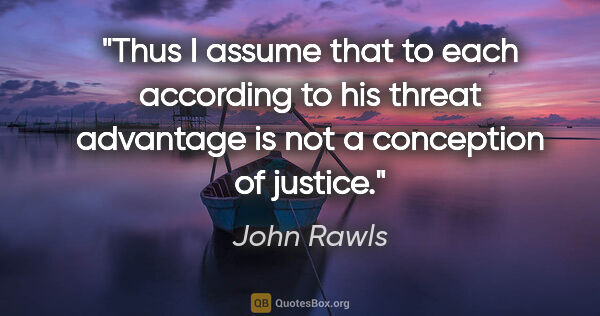Concept Quotes (page 15)

John Stuart Mill (20 May 1806? 8 May 1873), English philosopher, political theorist, political economist, civil servant and Member of Parliament, was an influential liberal thinker of the 19th century whose works on liberty justified freedom of the individual in opposition to unlimited state control. He was an exponent of utilitarianism, an ethical theory developed by Jeremy Bentham, although his conception of it was very different from Bentham's. He clearly set forth the premises of the...
John Stuart Mill
Glory is largely a theatrical concept. There is no striving for glory without a vivid awareness of an audience... The desire to escape or camouflage their unsatisfactory selves develops in the frustrated a facility for pretending -- for making a show -- and also a readiness to identify themselves wholly with an imposing spectacle.
Eric Hoffer
It never occurred to me that any of these pleasures were a reward for being a pretty good kid, any more than I needed to restructure my life just to avoid an eternity of being spit-roasted on a subterranean barbecue. If this sounds flip, smug, or disrespectful, it's not meant to be. Obviously, there is great wisdom, beauty, and relevance in millennia worth of collected theological teaching from around the world. The question I'm grappling with is: why didn't these big themes and major...
Michael J. Fox
It is really one of the most serious faults which can be found with the whole conception of democracy, that its cultural function must move on the basis of the common denominator. Such a point of view indeed would make a mess of all of the values which we have developed for examining works of art. It would address one end of education in that it would consider that culture which was available to everyone, but in that achievement it would eliminate culture itself.
This is surely the death of...
Mark Rothko
In Tar Baby, the classic concept of the individual with a solid, coherent identity is eschewed for a model of identity which sees the individual as a kaleidoscope of heterogeneous impulses and desires, constructed from multiple forms of interaction with the world as a play of difference that cannot be completely comprehended.
Toni Morrison
Poetry is only the highest eloquence of passion, the most vivid form of expression that can be given to our conception of anything, whether pleasurable or painful, mean or dignified, delightful or distressing. It is the perfect coincidence of the image and the words with the feeling we have, and of which we cannot get rid in any other way, that gives an instant "satisfaction to the thought." This is equally the origin of wit and fancy, of comedy and tragedy, of the sublime and pathetic.
William Hazlitt
If reason be judge, no writer has produced such inconsistent characters as nature herself has. It must call for no small sagacity in a reader unerringly to discriminate in a novel between the inconsistencies of conception and those of life. As elsewhere, experience is the only guide here; but as no one man’s experience can be coextensive with what is, it may be unwise in every case to rest upon it.
Herman Melville
To use books rightly, is to go to them for help; to appeal to them when our own knowledge and power fail; to be led by them into wider sight and purer conception than our own, and to receive from them the united sentence of the judges and councils of all time, against our solitary and unstable opinions.
John Ruskin
I used to think that paired opposites were a given, that love was the opposite of hate, right the opposite of wrong. But now I think we sometimes buy into these concepts because it is so much easier to embrace absolutes than to suffer reality. I don't think anything is the opposite of love. Reality is unforgivingly complex.
Anne Lamott
The word agriculture, after all, does not mean "agriscience," much less "agribusiness." It means "cultivation of land." And cultivation is at the root of the sense both of culture and of cult. The ideas of tillage and worship are thus joined in culture. And these words all come from an Indo-European root meaning both "to revolve" and "to dwell." To live, to survive on the earth, to care for the soil, and to worship, all are bound at the root to the idea of a cycle. It is only by...
Wendell Berry
